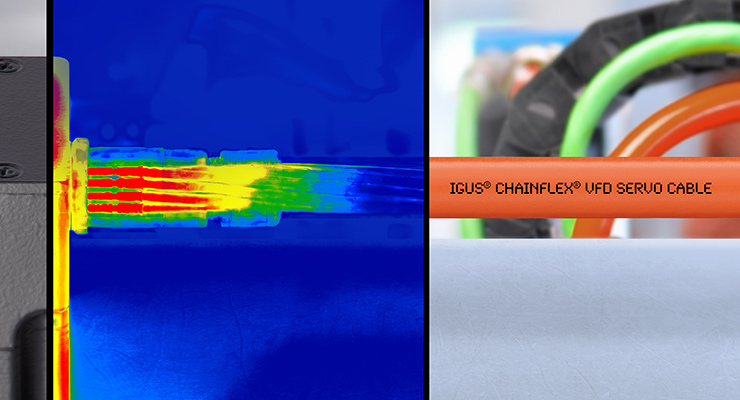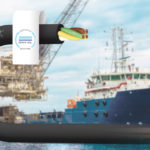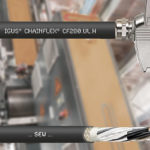To address the latest developments in frequency-controlled motors, the so-called VFDs (variable-frequency drives), show a clear trend: more compact design with the same or higher power with extremely high switching accuracy of the frequency converters.
As a result, in the future the user not only has to pay attention to the right number of conductors and AWG size combinations, but also to the electrical characteristics of the motor or servo cables. For that reason, the motion plastics specialist igus has been developing and testing materials made of high-performance polymers for years, which are perfect for these challenges.

Cable theory in physics describes an electric cable as an electrical quadrupole, comprised of inductance, capacitance, resistance and dissipation factor. Every electric cable has a certain inductance, capacitance and ohmic resistance depending on its structure and the materials used. The purely ohmic resistance in an industrial environment depends mainly on the conductivity of the conductor material (usually copper), its AWG size and length, while the capacitive values are strongly dependent on the insulating material.
Thus, two identical cables with identical conductor structures with the same length and AWG size with different insulation materials have completely different capacitive specifications.
Proper insulation material as a central factor for capacitance
Although the insulating material used plays a fundamental role in capacitance, many power, motor and servo cables are still being made on the market with PVC insulation. This material has many good specifications: it is cost-effective and easy to process, but also has an extremely high dielectric constant. A higher dielectric constant will increase the capacitive effects, therefore requiring more energy to charge and discharge the cable. This ultimately leads to higher losses and higher switching inaccuracies of the overall system.
In short, the higher dielectric constant of PVC has a greater capacitive effect than materials with a lower dielectric constant. The cost savings gained by using PVC insulated cables are lost on problems created with power cables from a drive to the motor.
Safe and reliable cables for high-frequency drives
Among other things, today’s generation of (VFD) frequency-controlled drives change their speed by changing the frequency of the drive voltage. Now, if a high capacitance cable is used in this variable frequency control system, a significant amount of energy is lost for the capacitance of the cable alone. This can lead in the worst case to unwanted reflections and voltage overlaps.
Hence the growing need for low-capacitive insulation materials. For more than 15 years, igus has been offering materials made of high-performance polymers for all its chainflex motor and servo cables used in the energy chain. These polymers have a lower dielectric constant with a high electrical resistance. The goal is to offer customers a cable that is tested to withstand continuous movement inside an Energy Chain and provide power from a VFD to the motor safe and efficiently.
Smaller motors require a new electrical supply
The maximum current carrying capacity of an electric cable is defined by the permissible maximum conductor temperature (usually marked on the cable) at a given ambient temperature. Depending on the insulation material used, this can range for PVC from 70° – 80°C and 90°C for TPE materials. The data for the cable temperature is calculated independent of the connector used to terminate the cable.
Since the old generation motors were usually larger than today’s with the same power level, and the metallic round connectors used were relatively large, both the motors and the connectors served as heat sinks.
Today, however, customers are demanding ever smaller, more compact, and above all, more powerful motors. Drive manufacturers are already coping with this demand by modifying many of the structural components of the motor including smaller connectors.
The trend is moving from larger motors, metallic round size M23 or larger connectors, toward today’s smaller motors with M18 or M16 round connectors with additional plastic housing insulation. Due to their small size, the motors get hotter when they run at the same power level as their predecessors. This means that a significant amount of the waste heat is driven directly into the first 3-4 ft of the cable.

The large metallic connectors of the past would help to absorb this heat. These new motors are using the connecting power/servo cable to absorb more heat. Although there are no consequences for the motor and the connected components in the short term, serious problems may be the outcome in the long term. If the insulation material of the cable does not withstand the elevated temperatures in the long term, short circuits can occur inside the cable and in the vicinity of the connectors, which in the worst case lead to fires. It is therefore important for cable manufacturers to respond to market developments with new insulation materials that can withstand the current requirements.
Tested igus insulation material for the latest servomotors
To prevent damage to the compact motors, igus now offers the solution in the form of a new insulation material for its chainflex motor and servo cables. Due to the high level of expertise in the development of new high-performance polymers, igus was able to develop a new material. This new insulation was qualified after five years of testing in the igus laboratory and extensive practical tests. This material has a low capacitance and, withstands the increased thermal requirements of the latest generations of motors.
This makes igus the only supplier in the global market to offer long-term tested series of motor and servo cables for continuous use in energy chains, which meet the specific thermal and electrical requirements of the latest motor and drive combinations.
Largest variety of cables tested, verified and certified
The igus range of cables undergoes extensive testing under real conditions in the company’s 30,000 ft2 test laboratory. For example, the servo cable CF29 was also tested with the new insulation material. In test no. 5034, the cable with a bend radius of 5.4 x d withstood over 45 million strokes inside an energy chain. This example along with igus’ continuous testing and data acquisition enabled the company to become the only manufacturer on the market to offer a 36-month guarantee on its entire cable range.
The data collected in the tests is also included in the chainflex service life calculator. With this, the customer can determine the service life of a selected cable online in advance. With more than 1,300 types, igus offers the largest product range of cables for the energy chain: from servo cables, motor cables and robot cables up to bus, data or fibre optic cables. With its range of cables, igus also has the world’s most comprehensive selection of international approvals. This includes cables with UL, EAC or DNV-GL approval. On request, igus also offers all cables harnessed as ready-to-connect and tested readycable.
igus
igus.com







Leave a Reply
You must be logged in to post a comment.